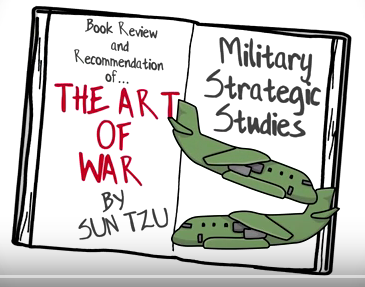Over the past two weeks, I have been enjoying more videos from FightMediocrity on YouTube. The owner and creator makes animated summarizes of books that he reads. They aren’t ever a straightforward summary of the book. Instead, he pulls examples or analogies from his own life or modern times to help illustrate the major points or lessons from a book.
If you are trying to get a job in a challenging industry or rough economy, I thought of you when I watched this video summary of the timeless military strategy book, Sun Tzu’s The Art of War:
Did you catch the relevance to you and the traditional strategy that most people use to try and get a job today? Submitting your resume in an online submission form to a major corporation is like attacking an enemy at their strongest defenses. The chances of you succeeding are painfully small. Is that what you are learning, or are you someone who found success with this approach? Either way, I would love to hear from you.
How can you take a different approach and improve you likelihood to get a job or make the career that you dream of? Hopefully this short video gave you some new ideas. If you want more, read Tip #8 in How To Be a Rocket Scientist: Know how to apply for a job. In that chapter, believe it or not, I applied lessons from Sun Tzu to give you several recommendations for ways you can use your strengths and qualities as an individual to artfully “fight” against the recruitment and hiring forces of large companies. Today there is something called “maneuver warfare strategy.” It started with Sun Tzu and more recently took tremendous advances through the thinking and ideas of a little-known US Air Force Colonel named John Boyd.
Want to get a job in a challenging and innovative field like aerospace or aviation? It is going to take some innovative thinking and maneuvering from you to make it happen! In my own case, one of my promotions happened after I left a large aerospace company to be an engineer using my aerospace engineering skills in another industry. I didn’t get the promotion with that move. But after working in the non-aerospace company for three years and gaining new skills, I then saw an opportunity to move back into aerospace (at the same company) at a higher level. I knew the groups and the people I would be working with, from my prior experience. Here is what was more important, I believe: the hiring manager already knew me. Again, it was from my prior experience working with the same groups.
I applied and got the job. That was how I moved from being an engineer to a project engineer / project manager.
How can you get known, get respected, and get sought after by the people who you want to be hired by? Think about the three lessons you just watched from FightMediocrity about Sun Tzu’s The Art of War. If you haven’t read my book yet, you can request any chapter for free on my website, include Tip #8. Or you can purchase the entire book on Amazon as a paperback or eBook. Then if you want to talk more, write a comment below or connect with me on LinkedIn or Twitter. I’ll be happy to help you maneuver your way into an exciting and rewarding career in rocket science!

I am glad this video series by FightMediocrity have brought you inspiration here! I remember reading this book in elementary school with 36 key strategies to learn from Sun Tzu. So this video has only scratched the surface, and the ancient Chinese secret is safe! Well, at least until the History channel decided to make a documentary about it.
https://youtu.be/VMNaULHLH9c
In regards to your tip #8, I am fighting this battle of career transition to “influence” my prospective employers in taking a second look of my strength. I find it by doing a SWOT analysis, I can identify if my strength can overcome my weakness. If not, I have to work with someone else in compensating them. Hence, successful leaders always work with a team to fill in their gaps.
As a bonus and if you are interested in learning Chinese, below depicts all 3 big ideas in the video.
知己知彼,百战不殆 (Zhī Jǐ Zhī Bǐ, Bǎi Zhàn Bù Dài) – Big idea #1
示弱避强,扬短隐长 (Shì Ruò Bì Qiáng, Yáng Duǎn Yǐn Zhǎng) – Big idea #2
不战屈人,善之善者 (Bù Zhàn Qū Rén, Shàn Zhī Shàn Zhě) – Big idea #3
Wow, thanks David! This book was one of your books to read in elementary school? That is fascinating.
Thanks for the History Channel documentary! This looks like a wholesome and insightful program to watch.
Doing a SWOT analysis is a great tool and tactic to successfully maneuver through a career transition. Partnering with others to cover a major weakness is very smart.
Thanks a lot for the Chinese lesson too! That’s a big bonus! Thanks for adding so much to the topic of how Sun Tzu’s Art of War can help us in our careers.
Every weekend i used to visit this web site, as i want enjoyment,
for the reason that this this website conations truly pleasant funny material too.
Thanks for visiting here and enjoying the website! I’m happy you shared that with your comment.
When someone writes an piece of writing he/she keeps the idea of a user in his/her mind that how a user can understand it.
So that’s why this post is amazing. Thanks!
Thanks very much for your comment and nice compliment! It’s encouraging to have constructive feedback like that. Thanks for reading and enjoying the article.